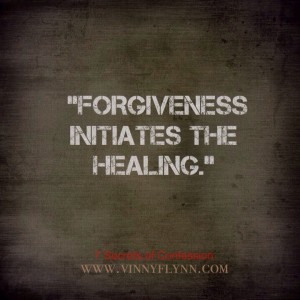In my quest for more knowledge on “how to get holy” I can’t seem to get away from the theme of mercy. I’m finding it everywhere. Maybe that’s because it permeates everything and lends itself to all other virtues; maybe it’s because showing mercy is not my strong point and the Lord seems to enjoy bringing me to my knees in a continual conversion of my own heart. Or it could simply be that at some point the journey to holiness brings you face to face with Mercy Incarnate and you begin to see His reflection (or lack thereof) in everything. I’m not sure.
Whatever the answer may be, this week we have another queue of power-house saints [1] who remind us that to practice mercy — in whatever form — is necessary for sanctity. I will be drawing from our saint of the day, St. Leo the Great, Pope and Doctor of the Church.
In many ways our society seems to tell us that to show mercy is for pushovers; in other words, it’s weak. To have compassion on those less fortunate, well, that’s fine, and even laudable in the eyes of the world, but what about forgiveness? What about the people in your daily life who have wronged you in some way: neighbors, coworkers, friends, family? Well, if someone has wronged you, forget about it, we are told. But Jesus responds, “You are thinking not as God does, but as human beings do.”[2]
In daily life, there are countless glances given, unkind words used, unspoken attitudes conveyed, and sometimes actions taken by others that hurt or offend us, even if not meant in the way we perceive them. The offender could be another driver on the road, a stranger, an acquaintance, or someone close to us. It doesn’t matter who it is, how deep the grievance, or even if it was purposeful: if it hurt and we don’t recognize that and do something about it, it’s as if we’ve been wounded by a poisonous dart that remains buried until it begins to fester. We need to acknowledge our injuries and forgive the ones who have hurt us so that we can be healed.
In my father’s book, 7 Secrets of Confession [3], he cites a beautiful (and relevant) passage from the Catechism: “Forgiveness initiates the healing.”[4] In other words, forgiveness is when we refuse to let the darts keep stinging us and we decide to pull them out instead, beginning the process of healing. There are different levels of forgiveness. In the daily Mass reading for today, Jesus shows us the first level:
“[If your brother] repents, forgive him. And if he wrongs you seven times
in one day and returns to you seven times saying, ‘I am sorry,’
you should forgive him.”[5]
“Ok, that’s not too hard,” we might think. “As long as ‘so and so’ apologizes, I guess I can forgive him.” But Jesus doesn’t stop there. He takes it a step further and shows us the next level by giving us the most perfect example from the Cross:
“Father, forgive them, for they know not what they do!”[6]
I don’t know about you, but honestly, this makes me uncomfortable. Here’s my confession: if I’m being honest with myself, when someone does something that hurts me and then doesn’t apologize or even acknowledge it, my first inclinations tend to be malice, vindictiveness, resentment, and yes, unforgiveness. After all, why should I forgive someone who doesn’t even care enough to recognize a hurt and apologize? Because that person doesn’t deserve it. Wait a minute, that’s confusing. If you hurt me I should forgive you because you don’t deserve it?! Let’s see what St. Leo has to say about this:
“The Lord says: Unless your justice exceeds
that of the scribes and Pharisees, you will not
enter into the kingdom of heaven (Mat 5:20).
How indeed can justice exceed, unless
compassion rises above judgement?”[7]
The Pope’s words show us the true meaning of this Scripture passage. The justice (or righteousness) we practice must be greater than that of the Pharisees. In other words, it must be the justice of God; and in His justice, “mercy triumphs over judgment.”[8]
When we have been hurt, what is the main reason that forgiveness is not on the top of our priority list? Judgment. For instance, if I don’t want to forgive someone who has hurt me, it’s usually because I’ve made a judgment on that person about what they “ought” to do. Even if objectively that judgment is correct, if that person doesn’t fulfill my expectation and I continue to judge, I’m not following the example of Christ. When I’m stuck in this judgment, there is no room, nor willingness, to give any benefit of the doubt. And by refusing to forgive, I am refusing to reflect God’s mercy and total acceptance.
St. Leo has some more wisdom for us that really gets to the heart of the matter:
“Mercy itself wishes you to be merciful, righteousness itself wishes you to be righteous, so that the Creator may shine forth in his creature, and the image of God be reflected in the mirror of the human heart as it imitates his qualities.”[9]
So if true forgiveness is the ultimate expression of mercy, and we are supposed to reflect the image of God, we must forgive even those who, in our eyes, don’t deserve to be forgiven. (Mercy is, in fact, always unearned and undeserved). We learn how to do this by looking to Jesus; by meditating on His Passion and really examining His actions and words during the Way of the Cross; by cultivating a devotion to Jesus as the Divine Mercy of God, gazing at the Divine Mercy Image and trying to become this Image. And what does this Image show Jesus doing? Blessing; inviting all into to His Heart; stepping forward to seek the sinner and show mercy.
Maybe the most helpful mediation is on our own sinfulness and the incredible mercy God shows to each one of us. If the Divine Creator can have mercy on me — a sinner who turns from Him daily and who doesn’t even yet recognize all my sins — how can I not show mercy to any fellow creature no matter what they’ve done?
Daily examen for this week
Today did I …
… bless people in my thoughts, words, and actions?
… invite people willingly into my heart without distinction?
… forgive the people who hurt, annoyed, or offended me (including bad drivers!)?
… seek out these people in my life in order to show them mercy?
… repent of my judgment towards these people?
… ask the Lord to bless these people and to give me the grace to bless them too?
“The business of this life should not preoccupy
us with its anxiety and pride, so that we no longer
strive with all the love of our heart to be like
our Redeemer, and to follow his example.”
Pope St. Leo the Great
[1] Here’s the line-up: Today we have Pope St. Leo the Great, Doctor of the Church;tomorrow: St. Martin of Tours, a compassionate Bishop;
Wednesday: St. Josaphat, another Bishop nick-named “the thief of souls” because of his success in bringing people back to the Church;
Thursday: St. Frances Xavier Cabrini, known for her work with the poor and underprivileged; Saturday: St. Albert the Great, another Doctor of the Church.
[2] Matthew 16: 23
[3] To view or purchase Vinny Flynn’s book, 7 Secrets of Confession, please visit our store: http://mercysong.com/shop
[4] 1502
[5] Lk. 17: 3-4
[6] Lk 23: 34
[7] Sermon 92, 1.2.3: PL 54
[8] James 2: 13
[9] Sermo 95, 6-8: PL 54


